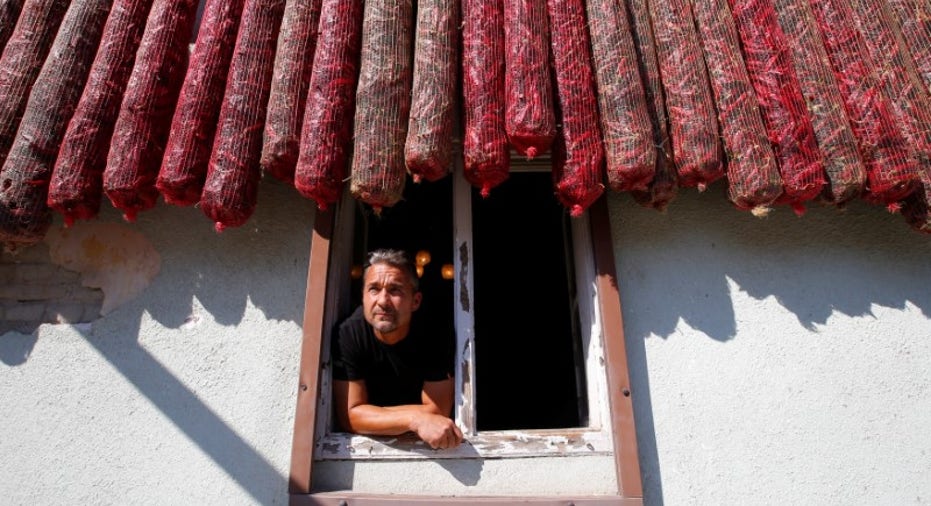Growth in peril as east Europeans "sweat blood" to find workers

At peak harvest time, Hungarian winemaker Sandor Font has enough work for 30 people at his vineyard south of Budapest - if only he could find enough grape-pickers.
On a recent sunny day he was expecting 20 to show up. In the end, he had to make do with about 10, mostly guest workers from Romania. "We are really sweating blood to find enough people. This is an enormous challenge," he says.
His struggles are a symptom of a wider problem for countries like Hungary, Poland and the Czech Republic, where years of heavy emigration to western Europe have created labor shortages that make it tough for businesses of all kinds to recruit.
That has the potential to curb economic growth and make it harder for these countries to catch up to Western European living standards. To plug the gaps, some of them are trying to poach workers from poorer, non-EU neighbors.
Prime Minister Viktor Orban, who has reinforced Hungary's borders to keep out more than a million mostly Muslim migrants who have flowed into Europe since the start of 2015, has called a referendum on Sunday to seek support for that stance. He plans instead to entice "culturally similar" workers from countries such as Ukraine or Serbia.
Since the collapse of Communism, Poland has lost 2.5 million workers to western countries, compared with about half a million for Hungary and 3.5 million for Romania.
"If you look at our history after 1989, the main problems of the Polish job market were high unemployment and low availability of jobs," said Andrzej Kubisiak, a press official at Work Service, Poland's biggest human resources company.
"The situation has reversed," he said. "The challenge becomes finding a candidate, not a job."
After years of steady economic growth, jobless rates are at their lowest in recent memory - 4.9 percent in Hungary and 5.3 percent in the Czech Republic. At the same time, vacancies in the two countries have risen to 55,000 and nearly 140,000 respectively, despite employers offering wage hikes of up to 20 percent in some cases, at a time of very low inflation.
"LAUGH IN MY FACE"
Peter Szabo runs a business producing powdered paprika, one of Hungary's best-known staples.
"The harvest gives me the creeps every year," said Szabo, who runs a labor-intensive operation to avoid the use of chemicals. "When there is a job to do, such as loading, and I offer people 800 or 1,000 forints ($2.91 or $3.63) per hour, they simply laugh in my face and say, look, the government is taking care of me."
Szabo wants the government to help farmers during harvest by suspending its public works program, a scheme that has hoovered up nearly a quarter of a million jobless people to work on projects like road maintenance and flood defenses.
The shortage of labor is so widespread that Sandor Baja, general manager at staffing company Randstad Hungary , has a hard time pinpointing the most worrying areas.
"I cannot highlight any, because nearly all jobs are problematic," Baja said in his office in Budapest. "It is very hard to find good professionals."
Even attracting workers from Romania's Transylvania region, home to the biggest ethnic Hungarian community in the region, is difficult, he said, because they tend to move on to the West.
Baja said companies would need to hike wages by "very close to double digits" per year in the short-term to stem emigration to richer neighboring countries.
GROWTH AT RISK
Economists say that in the long run, the exodus of skilled people and their replacement by low-skilled guest workers risks damaging the quality of the labor force and deterring foreign investors. Hungary slipped six places to 69th in a 2016 Global Competitiveness Report compiled by the World Economic Forum.
The labor crunch also jeopardizes the ability of central European economies to sustain the growth model they have maintained for the past two decades.
In a July report, the International Monetary Fund estimated that continued net emigration from central, eastern and southeast Europe from 2015 to 2030 could lower the region's economic output by nearly 9 percent altogether.
Poland, where the 8.5 percent unemployment rate is the lowest in a quarter of a century, is relying on more than a million workers from Ukraine to fill vacant jobs this year in areas like production, logistics or construction. It is working on new rules to allow guest workers to stay longer.
"Without them, many firms would have problems fulfilling their contracts. Many would have to close their doors," said Kubisiak at the Polish Work Service.
Big foreign investors in Hungary, such as German car makers Audi and Daimler , resort to sponsoring university faculties to ensure their hiring needs are met. Both declined to say how much they fork out on such programs.
Istvan Hollos, who runs a car repair shop on the outskirts of Budapest, is at the sharp end of the jobs crisis. He would like to expand, but cannot hire enough people.
"We can put up a job advert for months and have one or two applicants," he said. "Far from being able to select from a crop of quality workers, you need to make do with what you get."
($1 = 0.7688 pounds)
(Additional reporting by Wojciech Strupczewski in WARSAW, Tatiana Jancarikova and Jason Hovet in PRAGUE, Radu Marinas in BUCHAREST; Editing by Mark Trevelyan)



















